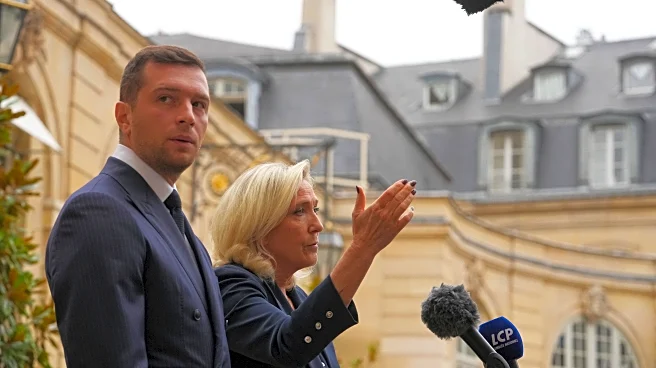France’s Prime Minister François Bayrou is scrambling to save his government and his job, holding talks this week with leaders across the political spectrum — including far-right leader Marine Le Pen — ahead
of a parliamentary confidence vote on his government’s plan to cut public spending.
Opposition parties have already vowed to reject the austerity budget, and Bayrou, a centrist, is widely expected to lose the Sept. 8 confidence vote, pushing France to the brink of another political crisis.
If Bayrou is defeated, that would leave President Emmanuel Macron in a highly uncomfortable position — forced either to find a consensus prime minister, a difficult task in a deeply divided France, or to dissolve the National Assembly once again.
Here’s what to know about France’s latest political turmoil ahead of the vote:
Bayrou himself triggered the confidence vote by announcing that he would seek parliamentary approval for his unpopular budget plans. Arguing that sharp cuts are needed to repair public finances, he unveiled plans last month to cut 44 billion euros ($51 billion) in spending in 2026, after France’s deficit hit 5.8% of gross domestic product last year, way above the official EU target of 3%.
France is also faced with a massive debt crisis. At the end of the first quarter of 2025, France’s public debt stood at 3.346 trillion euros, or 114% of GDP. Debt servicing remains a major budget item, accounting for around 7% of state spending.
Bayrou's plan, which includes removing two public holidays, has been slammed by his political rivals, who now have a golden opportunity to bring him down.
Bayrou, however, has not given up hope of surviving the vote and has organized a series of meetings with political leaders. Raphaël Glucksmann, a left-wing member of the European Parliament, said after talks with Bayrou on Tuesday that the prime minister should cancel the confidence vote if he truly wants to negotiate and seek a compromise on the budget, which Glucksmann called “unacceptable” in its current form.
Le Pen and her National Rally protégé Jordan Bardella also met with Bayrou and repeated their total opposition to his solutions, calling for new legislative elections.
Le Pen was convicted in April of embezzlement and barred from seeking public office for five years. She is appealing the ruling but her legal problems aren’t holding her party back. Leading in opinion polls, National Rally leaders have repeatedly insisted they are ready to govern if Bayrou falls.
“The only way for a prime minister to have a longer tenure would be to break with Macronism," Le Pen said. “It is Emmanuel Macron’s policy that is deeply toxic."
On the far left, Jean-Luc Mélenchon’s France Unbowed said it will not support any government other than one led by his party, and has urged Macron to step down if Bayrou fails to win the confidence vote.
Far-right and left-wing lawmakers hold over 320 seats at the National Assembly while the centrists and allied conservatives hold 210, making it impossible for Bayrou’s government to survive if opposition groups team up.
Macron says that he intends to “serve out his term" and has urged political forces to “find paths of agreement” on the budget ahead of the vote.
“The challenge is not insurmountable,” said Macron, whose decision last year to call early legislative elections led to the chaotic situation in parliament, divided among three minority blocs that do not have enough seats to govern alone.
French politics have been in disarray since Macron called the snap elections. With one of the world’s biggest economies, France’s failure to pass a budget has worried investors and hurt the 20-country eurozone. The previous government collapsed over its budget plans, which included slashing 40 billion euros ($42 billion) in spending and raising taxes by 20 billion euros. Bayrou’s version has not proved any more popular.
In addition to the confidence vote, Bayrou's government could face a nationwide day of disruption on Sept. 10. The “Bloquons Tout” (Block Everything) movement, originating on social media, is organizing groups across the country to stage a coordinated day of protest against government policies. The movement gained national attention this summer following the announcement of the 2026 budget and its controversial measures, including the plans to remove two public holidays.
If Bayrou loses, Macron could appoint a figure from the traditional left or right to try to consolidate his centrist alliance. Either option, however, would face a precarious political environment. Bayrou succeeded conservative Michel Barnier, who was ousted after only three months in office.
Names circulating as potential successors include Sébastien Lecornu, France’s youngest-ever defense minister at 39; Gérald Darmanin, former interior minister and current justice minister; and Catherine Vautrin, an experienced center-right politician serving as labor minister.









